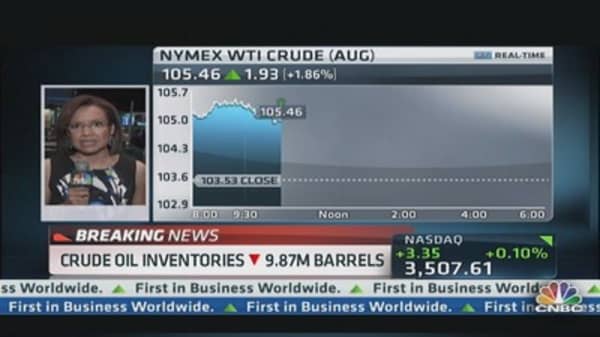Data showing a surprisingly steep drawdown in U.S. stockpiles powered U.S. benchmark crude above $106 per barrel Wednesday—its highest since March 2012—en route to a 3 percent gain on the day.
Despite new worries about China's growth, crude broke free from the economic concerns shackling price gains. Oil went on a tear after figures from the Energy Information Administration showed that inventories had plunge by nearly 10 million barrels last week.
The data confirmed American Petroleum Institute figures released Tuesday that showed a drop of 9 million barrels and reflected an increasingly tight domestic energy market.
With China struggling and Europe still on its heels, analysts are doubtful that global demand will continue to justify crude prices above $100. Nonetheless, West Texas Intermediate has been surging for weeks, with the contract up nearly 30 percent over the last year and narrowed its spread with Brent to less than $3. The last time WTI traded above Brent was before the U.S. recession.
The stockpile data combined with the Federal Reserve's minutes, sending crude on a torrid rally. U.S. crude settled up by nearly $3, at $106.52, its strongest level in 16 months and its largest one-day gain since May 2. WTI has now surged more than 11 percent in the last 10 sessions, its steepest rally since July 2012.
Meanwhile, gains in Brent crude futures were comparatively tame, rising 50 cents on the day to trade above $108.





